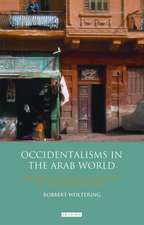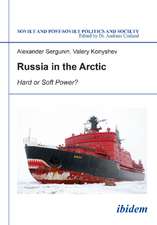Argentina: What Went Wrong
Autor Colin M. MacLachlanen Limba Engleză Hardback – 29 apr 2006 – vârsta până la 17 ani
Preț: 356.10 lei
Preț vechi: 415.33 lei
-14% Nou
Puncte Express: 534
Preț estimativ în valută:
68.14€ • 72.87$ • 56.81£
68.14€ • 72.87$ • 56.81£
Carte tipărită la comandă
Livrare economică 18 aprilie-02 mai
Preluare comenzi: 021 569.72.76
Specificații
ISBN-13: 9780275990763
ISBN-10: 0275990761
Pagini: 240
Dimensiuni: 156 x 235 x 25 mm
Greutate: 0.53 kg
Editura: Bloomsbury Publishing
Colecția Praeger
Locul publicării:New York, United States
ISBN-10: 0275990761
Pagini: 240
Dimensiuni: 156 x 235 x 25 mm
Greutate: 0.53 kg
Editura: Bloomsbury Publishing
Colecția Praeger
Locul publicării:New York, United States
Notă biografică
Colin M. MacLachlan is John Christie Barr Distinguished Professor of Latin American History at Tulane University. He is a member of the Executive Board of the Rocky Mountain Council of Latin American Studies, the Advisory Board of the Latin American Labor Institute, and a former member of the Board of Governors of the Pacific Coast Council of Latin American Studies. He is the author, co-author, or editor of a dozen books, including histories of Mexico, Brazil, and Latin America.
Cuprins
Foreword by Douglas BrinkleyAcknowledgmentsIntroductionChronology1 Fringe of Empire2 The Compromise3 Urban Reality4 Confronting the Oligarchy5 The Age of Perón6 A Distant Shadow7 The Proceso's Dark Shadow, Menem, and NeoliberalismConclusion: Who or What Is to Blame?GlossaryNotesSelected Bibliography of Works in EnglishIndex
Recenzii
Life in Argentina presents challenges that not all Argentines are prepared to meet, as they prefer to emigrate rather than resolve the gnarls that distort national life--corrosive social stresses, endemic corruption, and what this author calls the culpable irresponsibility of its leaders. Constructing a coherent narrative from deceptive sources would seem impossible, but distinguished Latin American history professor MacLachlan succeeds brilliantly. Rather than attempt to reconcile the irreconcilable currents that threaten civilized life in Argentina, he presents them in all their splendid irrationality. His first four chapters discuss the events and ideologies that formed contemporary Argentina. Emphasis is on the struggle to define a national identity: countryside versus capital city, modernizers versus traditionalists, supporters versus resisters of authoritarian rulers from Rosas to Peron (Peron) to the Proceso. The book's second half takes readers through the labyrinth of successive presidencies, from Rivadavia to Menem. Pushing beyond objectivity, MacLachlan disentangles motives, actions, and outcomes that puzzle non-Argentines yet are accepted by natives as the way we do things here. This is a most welcome and useful addition to the author's earlier volumes on Mexico and Brazil. Highly recommended. All levels/libraries.
[T]races the development of Argentina from its early colonial past to this century. Interlacing political, economic, and cultural history, he analyzes the complex interaction of factors responsible for both the country's rise and fall. He concludes by summarizing the numerous ideological, political, social, and economic factors and trends that collectively caused the collapse.
In 1900, Argentina compared favorably to the proserous countries of the world, but by 2000, it was economically prostrate, its currency worthless, its government in default. MacLachlan's history works in observations about the causes of Argentina's ailments as it narrates the country's political gyrations, which exacerbated its century-long decline..Sympathetic to the Argentine people, MacLachlan is an able analyst of the governments under which they've endured.
[T]races the development of Argentina from its early colonial past to this century. Interlacing political, economic, and cultural history, he analyzes the complex interaction of factors responsible for both the country's rise and fall. He concludes by summarizing the numerous ideological, political, social, and economic factors and trends that collectively caused the collapse.
In 1900, Argentina compared favorably to the proserous countries of the world, but by 2000, it was economically prostrate, its currency worthless, its government in default. MacLachlan's history works in observations about the causes of Argentina's ailments as it narrates the country's political gyrations, which exacerbated its century-long decline..Sympathetic to the Argentine people, MacLachlan is an able analyst of the governments under which they've endured.







